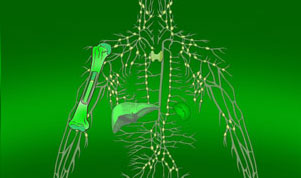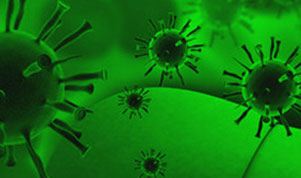The applicable vaccination schedule must be followed. Recently, there has been quite a broad movement to stop vaccinating children. In most cases, there are no absolute contraindications to vaccination, only indications to postpone it. This was presented in the article by Dr. Ilona Małecka "When should you not vaccinate your child?" When considering the benefits of vaccination and the possible disadvantages resulting from it, there can be only one answer - you have to vaccinate. Any exceptions to this rule should be based on important premises, and the decision should be made by an experienced clinical immunologist and pediatrician.
A child is born with the so-called innate immunity. primary immunity. Unfortunately, these disease-protecting antibodies (antigens) given to you by your mother last only for the first three months after birth. Then, until the age of nine months, the baby's immune system deteriorates. He is only learning to recognize the enemy, i.e. viruses and bacteria and to produce a suitable weapon against them - antibodies. Thanks to vaccines, he learns faster and more effectively.
Vaccine - this is nothing more than weakened or dead pathogenic microorganisms introduced into the body, provoking the immune system to produce antibodies. It is training that prepares the body to instantly recognize germs and send an army of antibodies against them. This army will either protect the child from the infection, or at least significantly mitigate its course. In order for the acquired immunity to last for many years, it is necessary to take the so-called booster doses of the vaccine.
Simply put, vaccines save lives. You have the power to protect your baby from dangerous illnesses like measles, tetanus and hepatitis. Being a parent is a big responsibility, and the best thing you can do for your child's health is to learn the facts so that you can make the best choices.
Thanks to our nation's successful vaccination program, parents today have been spared witnessing the devastating effects of many diseases. Polio, for example, paralyzed millions of children worldwide before the vaccine was created.
Diseases such as hepatitis, pertussis and measles can still infect children that are not protected. In fact, each year the press publishes stories of disease outbreaks in undervaccinated communities across the Europe and the United States. Since 2010, we have been experiencing large outbreaks of pertussis across the country. In 2012, there were 48,277 cases of pertussis and 20 deaths; in 2013, there were over 24,000 confirmed cases of pertussis in the U.S.; in 2014 there were 28,660 reported cases, and the outbreaks continue in 2015. In addition, there are currently a record number of measles cases in the U.S. In 2014, 644 cases of measles were reported to the CDC and like pertussis, measles oubreaks are continuing to affect the U.S. in 2015. The majority of measles cases reported in 2014 were in people who were unvaccinated or who had an unknown vaccination status.
NHS vaccinations and when to have them
It's important that vaccines are given on time for the best protection, but if you or your child missed a vaccine, you should contact your GP to catch up.
NHS vaccination schedule
Vaccines for babies under 1 year old
| Age | Vaccines |
|---|---|
| 8 weeks | |
|
12 weeks |
6-in-1 vaccine (2nd dose) |
|
16 weeks |
6-in-1 vaccine (3rd dose) |
Vaccines for children aged 1 to 15
| Age | Vaccines |
|---|---|
|
1 year |
Hib/MenC vaccine (1st dose) |
|
2 - 15 years |
Children's flu 2 (every year until children finish Year 11 of secondary school) |
|
3 years and 4 months |
MMR vaccine (2nd dose) |
|
12 to 13 years |
|
|
14 years |
|
Vaccines for adults and vaccines for pregnant women |
|
Tips How to Enhance ImmunityBut regardless of vaccinations, the most important thing is to take good care of non-specific immunity. Non-specific immunity - this is our innate immunity, which acts the earliest and protects us against diseases forever. Taking good care of your immunity includes, among others: appropriate amount of exercise, preferably outdoors, proper and varied diet, use of proven immuno-supplements, e.g. Immulin. Moreover, there are many situations in which we can worsen our own immunity and that of our children. Below are 10 situations that may have a negative impact on our immunity. By avoiding these, we will contribute to eliminating their negative impact on immunity. |
|
|---|---|
1. Exchange of immune stimuliFriendship can be a wonderful stimulus for developing the immune system. Research shows that the less interpersonal contact we have at home, at work and in our surroundings, the more likely we are to get sick, our brain will be flooded with chemicals that cause anxiety, and our lives will be shorter than those of our more social peers. In one study, researchers monitored 276 people between the ages of 18 and 55. They found that subjects who had six or more contacts fought viruses 4 times better compared to those who had fewer contacts. What to do? Don't let excess responsibilities, workload or lack of time prevent you from maintaining personal contacts. Instead of sending emails or text messages, take time to maintain personal connections with family, friends, neighbors and co-workers. |
 |
2. Adequate amount of sleepSleep deprivation has a significant detrimental effect on the immune system. The importance of sleep for the immune system is confirmed by, among others, observation of students who became ill while preparing for exams at the expense of sleep. Poor sleep is associated with poorer immune system function and a reduction in the number of immune system cells (NK cells) that fight microbes. In fact, researchers at the University of Chicago found that people who slept only four hours a night for one week produced half as much flu-fighting antibodies as those who slept 7.5 to 8.5 hours. Influenza vaccination induced antibody production. Therefore, less sleep means a worse response to vaccinations. What to do? Most adults need 7 to 9 hours of uninterrupted rest each night, although how you feel in the morning or during the day may be a better indicator. However, if you are tired when you wake up in the morning, you may not have gotten enough sleep, or maybe the quality of your sleep was not sufficient. Do you wake up many times during the night? See → Eleven Tips for Better Sleep. In the case of permanent and severe "sleep problems", it is worth seeking specialist help at a sleep disorders clinic. |
 |
3. The right moodWhen pessimists give a more positive direction to all the misfortunes in their lives, they will have less stress and better health. A classic now study conducted at the University of California Los Angeles found that law students who started their first semester more optimistic than they had experienced had more T helper cells, which may enhance the immune response, and more active NK cells, compared to students with a more pessimistic attitude. One reason may be that optimists take better care of themselves. It may also be because less stress has a less negative impact on components of the immune system, such as natural killer cells, so that they do not suddenly stop fighting. (Source: Optimism is associated with Mood, Coping and Immune Change in Response to Stress What to do? Look for reasons - even small ones - to feel happy every day. It sounds cheesy, but at dinner, try starting a conversation with your loved ones to share some of the good things that happened during the day. Try → How to Train Your Brain to Be More Optimistic |
 |
4. Don't suppress your emotionsA constructive argument with your spouse can have a positive effect on your immunity, say scientists from UCLA (University of California Los Angeles). They asked 41 satisfied couples to discuss their marital problems for 15 minutes. During this time, researchers found they had a sharp increase in blood pressure, heart rate, and white blood cell count (those associated with the immune system), similar to what was seen after moderate exercise. But the spouses were to remain polite. Couples who often treated each other unkindly, offensively and disrespectfully had fewer virus-fighting natural killer cells, had higher levels of stress hormones* and took 40% longer to recover from an argument than those who were able to behave positively and empathically during an argument. What to do? Don't suppress what worries and worries you. People with D personality, i.e. prone to stress and who suppress emotions, not only have fewer T killer cells, but these cells are less active than in people with expressive personality. * Stress hormones are primarily adrenal hormones: cortisol, adrenaline and norepinephrine. Their excess may cause hypertension, heart rhythm disorders, coronary heart disease, obesity and diabetes). |
 |
5. You act under pressureChronic stress - such as that caused by everyday uncertainty in the workplace or a serious illness of a loved one - has a multilateral negative impact on our health, including our immunity. There is compelling scientific evidence that this type of severe stress* (as opposed to the physiological stress associated with, for example, an exam, a bad day, or a simple domestic argument) causes a measurable reduction in the immune system's ability to fight disease. Periods of severe stress can reduce the number and activity of our defense cells, such as Natural Killer Cells, reduce the activity of macrophages and consequently increase the negative impact on the immune system. What to do? We are not going to tell you to take a long bath or light scented candles in such a situation (unless they provide you with a real relaxing effect). You need to find healthy and effective relaxation techniques. It may be physical activity or relaxation meditation techniques, e.g. yoga, or maybe activity in the kitchen and preparing a dessert. It is important to define the problem and approach it proactively. (Learn relaxation techniques and read about → "Stress Vaccine".) * severe, long-term negative stress is called distress and causes numerous negative ailments, e.g. it may cause hypertension, peptic ulcer disease, coronary heart disease, etc.). |
 |
6. You drive everywhere instead of walkingIt is difficult to overestimate the role of physical activity on our health. But doctors warn that the fitness and physical activity of children and adolescents is considerably decreasing, while the activity of adults is often limited to watching sports in front of TV. Scientists compared physically inactive people with those who walked briskly almost every day. During 4 months of observation, it was found that the number of days in inactive people when they were sick was twice as high compared to physically active people. What to do? Experts have found that 30 minutes of daily aerobic exercise - such as brisk walking - flushes leukocytes back into the circulatory system, contributing to better immune function. |
 |
7. There is a cigarette smok around youThere is no need to explain that smoking has a terrible effect on our entire body. But passive smoking (i.e. inhalation of cigarette smoke by children and non-smokers) is almost as harmful. It is estimated that in Poland the number of deaths caused by passive tobacco smoking is approximately 1,000 per year. With the increasing incidence of, among others, lung cancer in active smokers, the population risk of developing this cancer in passive smokers increases. Children who smoke passively are at greater risk of respiratory infections. Passive smoking can cause allergies and bronchial asthma. It also significantly worsens the course of asthma in preschool children. What to do? It seems obvious that you should avoid secondhand smoke in any possible way, including not being around people while they are smoking. Encourage everyone around you (spouse, co-worker, neighbors) to stop smoking. |
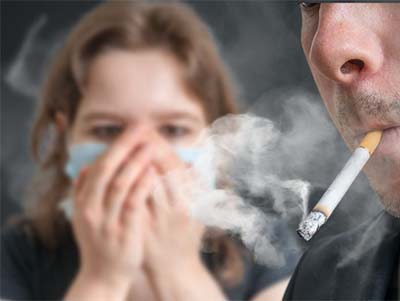 |
8. You use antibiotics easilyStarting taking an antibiotic at the first sign of a runny nose may, over time, develop resistance to the drug and cause a more serious infection. Scientists found that some patients easily taking antibiotics had reduced levels of some cytokines, i.e. proteins that transmit information in the immune system. When the immune system is suppressed, it is much easier for bacterial strains to develop resistance or we may easier become ill in the future. What to do? Use antibiotics only for bacterial infections. Start immediately and always take the full treatment. Do not use antibiotics for preventive purposes unless prescribed by your doctor. Do not store or share antibiotics not used in treatment. However, notice, that it may happen that you may get antibiotics (and some hormones) in food, mainly meat. Look → What Consumers Need to Know about the Use of Antibiotics in Food Animal Production.) |
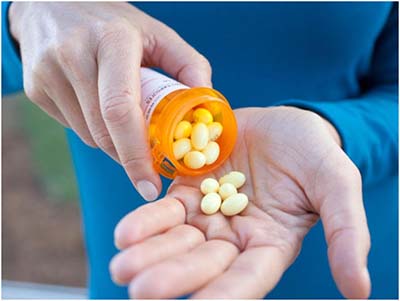 |
9. You like it warm and you don't like "airing"A proven way to increase immunity is to harden the body. Just end your bath with a cold shower or use alternating showers. Pour warm water over your body for half a minute and then cold water for a few seconds. Attention! temperature differences must be changed gradually, and the hardening procedure must always be finished with warm water. Should children be toughened up? Absolutely yes! Especially the sickly ones. Toughened up children get sick less often and have a stronger immune system. It is often thought that children get sick because of the cold. They are very wrong. Overheating disturbs the child's developing internal thermoregulation, which makes it less tolerant to temperature changes, gets cold more quickly and is therefore more likely to get sick. Children tend to get sick because of colds, and this is something completely different and even opposite to "cold". The most common cause of colds is lack of resistance to cold. A child will not gain this immunity by avoiding the cold. In other words, the main cause of colds and infections is the child's overheating, especially in the autumn and winter. |
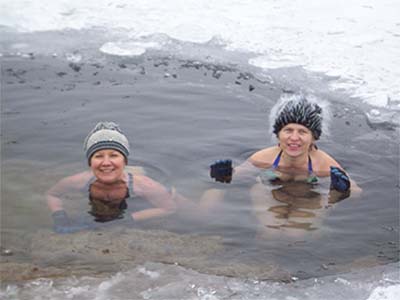 |
10. You take everything too seriously
Scientists have found that positive emotions combined with loud (sincere) laughter reduce the level of stress hormones and increase the number of some immune cells while activating others. In a study conducted at the Loma Lind Medical Academy in California, healthy adults who watched a funny video for an hour had increased immune system function. Psychological distance plays a significant role in our relationships and overall well-being. It refers to the emotional and cognitive space between individuals, influencing how we perceive, communicate, and connect with others. By understanding the concept of psychological distance, we can gain valuable insights into our own mental health, cognitive processes, and emotional well-being in relationships. What to do?: Try to laugh more. And you know: watch your favorite comedies, arrange a coffee with a friend who is known for being cheerful and good spirits, and read those forward-looking but also funny e-mails from friends before you automatically press delete. |
 |



